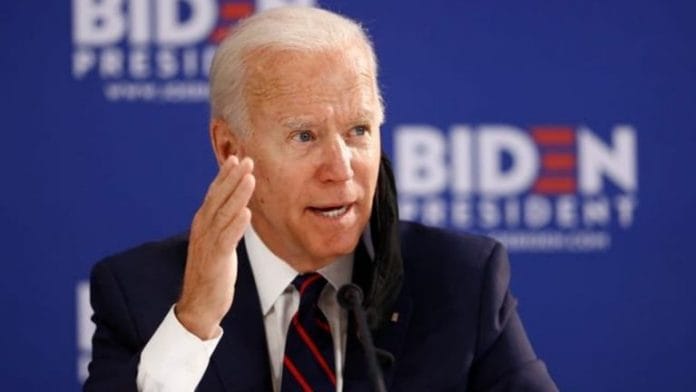The US is at a crossroads. The 2020 Presidential election is both critical and momentous for the country. The choice that American voters make will certainly have global implications.
This election has also triggered popular interest in India. The one question that is doing the rounds is — Trump or Biden, who is better for India?
While the raging pandemic may cause a delay in the results following the Election Day on 3 November, pundits are busy debating the question. Economically, strategically and socially, the relationship with the US matters to India more than any other bilateral engagement.
‘Will always be America First’
To begin with, we have to remind ourself of British Prime Minister Henry John Temple’s dictum from 1848, “We have no eternal allies, and we have no perpetual enemies. Our interests are eternal and perpetual, and those interests it is our duty to follow.”
However egregious President Donald Trump may appear and appealing Democrat candidate Joe Biden may seem in contrast, every US President will always swear by “America First”. If Biden’s long stint as Delaware Senator is anything to go by, his conduct will solely be guided by national interest. It’s upto India how it makes itself economically and strategically stronger and internally more cohesive to maintain and enhance its weight compared to the US.
The US relationship is the most important of India’s bilateral ties, having grown in recent years owing to China’s belligerence. The ‘China conundrum’ is here to stay and Biden is unlikely to reverse Trump’s policy of being ‘tough’ on China, defying popular sentiments.
Through ups and downs, the Indo-US bilateral relationship has blossomed over the years. In 2020, it is the frightening prospect of a powerful, assertive and hegemonic China that has further brought New Delhi and Washington closer.
Republican and Democrat presidents have been amenable to India
US Presidents can often make a real difference to bilateral ties, including trade, immigration policies, and larger strategic issues. Presidents, across the partisan divide, have engaged India with passion and vigour. There have been Democratic and Republican Presidents who have viewed India as a partner, and those who have taken a less favourable view of India.
There have been Democrats like John F. Kennedy and Barack Obama who invested in improving ties with India. There were also Democrats like Bill Clinton when ties took a plunge in his first term (1993-1997). While his second term saw much improvement and damage control, it only proves the fact that international relations are transactional.
While Richard Nixon, a Republican was particularly antagonistic towards India, George W. Bush signed the India-US Civil Nuclear Deal and was loved in India, prompting Forbes to call him: “The Best American President India’s ever had”. The Trump administration has been friendly, barring a few trivial disagreements over trade and Biden is also not expected to usher in any radical shift in policy.
According to UBS Global Research, Biden’s win in both Houses of Congress will mean ‘potentially more favourable US trade policies’ for India, boosting investors’ sentiment and pushing up markets. A Biden victory may also replace the Federal Reserve’s current chair Jerome Powell with someone more dovish in 2022.
If Trump wins, they predict that an unorthodox chairman could be nominated who might even look at negative rates, resulting in continued inflow of cheap capital into Indian stock as well as debt markets.
World’s good is India’s good
What the financial analysis overlooks is the Democratic commitment to human rights, religious freedom and minority opportunities that successive Indian governments have found irksome.
Biden’s comments regarding ‘restoration of people’s rights in Kashmir’, NRC in Assam and CAA caused a kerfuffle in India. While these are not traditional Republican concerns, Trump’s harsh rhetoric on immigration and reduction in visa issuance will be interesting, considering the Indian diaspora in the US is one of the most successful expatriate communities.
Though it may seem that the damage done to American democratic institutions, the consequences of Trump’s eccentricities on multilateralism, climate change, Middle East, the Covid-19 pandemic or unapologetic racism in the US make little difference to us, it’s not true.
Stability, not craziness at the helm is in global interest, regardless of nationality or ethnic origin. Indians must not look at the election only in terms of what matters to India, but what is good for the larger world. A more chaotic, irresponsible, insular and inward-looking America under Donald Trump will vacate space for China and embolden ambitious, irredentist mid-size powers, which could potentially descend the world into further turmoil.
Rajarshi Nath is a student of Indian Institute of Social Welfare & Business Management, Kolkata






